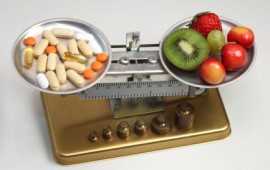To Supplement or Not to Supplement?
Author: Shannon Miller Lifestyle

Losing weight? On a restrictive diet? Curbing portions?
If you are on a restrictive diet, try to make sure there is not so much restriction that you are missing out on basic nutrients. How can you tell? A diet that tells you to cut out a macronutrient (carb, fat, or protein) totally is not a healthy diet. A diet that tells you to completely cut out anything that you know is necessary for basic health is not a healthy diet. Water, fruits, vegetables, and protein sources are all necessary to sustain a healthy life.
A perfect diet already has all of the vitamins you need every day. But who has the perfect diet? If you are watching what you are eating, but you feel like there may be some holes in your nutrition on some days, it is best to take a multivitamin that fills in the spaces. A basic multivitamin will have up to 250% of your daily need of the basic vitamins (A, B, C, D, E, and K) and minerals (calcium, iron, magnesium, zinc, selenium, copper, manganese, and chromium).
The list of possible nutritional supplements goes on and on, as does the wall at the vitamin store. Many of them are very convincing, but you should know that there are very low standards for supplements’ criteria for sales. Many could be dangerous. The rules the FDA has to govern supplements are very limiting. They can test and then pull items off the market, but that is after many have been sold and proven harmful.
Four proven supplements that help in overall health are:
- Green tea: better in brewed drink form than in a compressed supplement, green tea has books written on its health benefits. It could possibly reduce risk of many cancers, heart disease, and dementia. And more? Yes, it is proven to increase metabolism. It’s natural and calorie-free.
- Capsaicin: This chemical exists naturally in hot peppers. It is best in its natural form, but it can now be taken in supplement form as well. Capsaicin decreases hunger sensations and increases metabolism. It also reduces inflammation. There, you have a triple whammy against unnecessary weight. Be warned, though, excess capsaicin can cause abdominal discomfort. – Don’t take capsaicin if you have GERD or other digestive problems. (Source: Rae Uddin, Livestrong, 2011).
- Acai: This fruit can be enjoyed in its natural form or as a juice, or it can be taken as a supplement, which will not have the potency of the natural fruit. Acai is one of the world’s best foods, because of its concentration of antioxidants. – There is no research that acai increases metabolism or is an appetite suppressant, so be leery of such claims.
- Fish oil: If you are not getting 2 servings of low-mercury fish per week, fish oil may be for you. Fish oil is linked to heart and brain health, but also to lowering blood triglycerides (fats in the blood), which could save your heart, and , according to research by the Federal Government of the US, could help with weight loss.
Two other supplements that are getting a lot of buzz are:
- Hoodia: a plant from Africa. Compressed forms are being sold as appetite suppressants. There is no research linked to the claims that hoodia works as a dietary supplement or appetite suppressant.
- Chromium: Though trace amounts of this mineral are important in metabolism, the research on large supplemental doses proves that chromium may make you appear to have lost weight, when it really moves fluids away from muscles. This creates an illusion of a more-cut physique or weight loss, but this effect is short-lived and not an accurate view of the body’s true composition.
